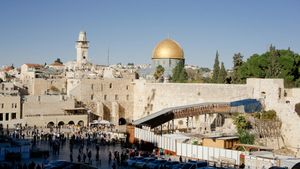Russian forces are making significant territorial gains against Ukraine, particularly in the Kursk region, as reports emerge of North Korean soldiers joining the fight. This development raises questions about the shifting dynamics on the battlefield as the conflict continues to evolve.
According to new assessments from the Institute for the Study of War (ISW), Russia has successfully reclaimed ground from Ukrainian troops. The recent fighting has escalated intensely, particularly since Ukrainian forces made early August gains, marking one of the most substantial offensives since the war began. This offensive represented Ukraine's first significant incursion onto Russian-held territory since World War II and highlighted the stakes involved for both nations.
Ukrainian military actions have reportedly focused near the town of Sudzha, which Kyiv secured shortly after their campaign began. The situation has been fluid, with Russian troops making advances closer to Korenevo, situated to the northwest. Yet, Ukrainian forces have managed to maintain control around Sudzha, even as Russian troops continue to push southward.
Reports leading to this refresh of military struggles indicate Ukraine has lost over 40% of the territory it had previously controlled; it seems their grip has tightened around only around 309 square miles, down from 531 square miles during the height of their control. This shift suggests not only increased pressure from Moscow but also raises the question of whether Ukraine can sustain its military momentum amid these losses.
With Russian troops reportedly numbering around 60,000 concentrated in the Kursk region, their counterattacks seem to be intensifying. Although Ukraine has acknowledged these Russian maneuvers, the situation remains complex. Despite the Russian military's slow push back of opposition forces, they continue to gain ground particularly in eastern Ukraine, strategically moving toward the transit hub of Pokrovsk.
Further complicate the battlefield dynamics, intelligence from South Korea and the US suggests nearly 10,000 North Korean soldiers have been sent to assist the Kremlin. These soldiers are said to be integrated carefully within Russian military units, dressed similarly to their Russian counterparts to maintain cohesion on the battleground. This collaboration signifies not only military support but symbolizes a geopolitical alliance against Western powers, reinforcing the current hostility between NATO and Russia.
An official from Ukraine's General Staff informed the media via Reuters, stating, "Russia's own troops are not enough for operations in Kursk. So they are trying to attract troops from North Korea there." This commentary appears to indicate frustration on the Ukrainian side over the complexity of the current military situation.
Reports have also surfaced indicating North Korea's influence on Russian military supplies; it is alleged Pyongyang is providing missiles and ample munitions to support the Kremlin's prolonged military campaigns. The intelligence assessments specify this exchange isn't one-sided, with Moscow reciprocally offering North Korea air defense systems and other assorted economic aids. The exchange potentially strengthens both regimes by intertwining their military capabilities and economic interests.
The situation is consistently shifting, prompting concerns and excitement throughout the international community. With NATO responding to Russia's threats by calling emergency meetings, it becomes evident global stability hangs precariously as the region navigates these alarming developments. Reactions from Western officials and allies suggest they remain vigilant, ready to adapt to the forthcoming changes as the conflict escalates.
For Ukraine, the war is far from over, and the intensified combat, amplified by new foreign actors, prominently situates Kyiv's leaders at the heart of difficult decisions. Can they counterbalance the newly bolstered Russian forces with support from their traditional allies? Or will external reinforcements lend Russia the upper hand? This uncertainty undoubtedly adds to the mounting pressures for decision-makers on both sides.
Meanwhile, the personal stories of soldiers and civilians deeply affected by the conflict offer more than just strategic insight; they humanize the data and numbers, shedding light on the emotional and psychological ramifications this war inflicts on both Ukrainians and Russians alike. With each struggle and setback, the pain and resilience of those at the forefront continually reassert themselves, reminding us of the grim human stakes involved.
Moving forward, the geopolitical chess match between Russia and Ukraine, lionized by their respective outlooks and alliances, will likely influence the global order for years to come. Each maneuver may lead to broader repercussions, asserting how interconnected today's international relations are.
The battlefield is not only restricted to the physical. Propaganda, media portrayals, and the public narrative play pivotal roles, shaping perceptions on both local and global scales. Whether through the increased military presence of North Korean troops aiding Russia or the steadfast resolve of Ukrainian forces striving to reclaim lost ground, the conflict’s portrayal shifts perceptions and maintains public engagement with the war.
Analyzing the international response to these developments remains imperative to understand broader geopolitical consequences. The stakes continue to rise, intriguing observers over how such maneuvers will shift perceived alliances or alter global perceptions toward both superpowers involved.
Despite the contested narratives and real-time developments affecting millions, the lasting legacy of this conflict will hinge on societal resilience and the ability to balance national interests with the collective humanity affected by this tragic war.



